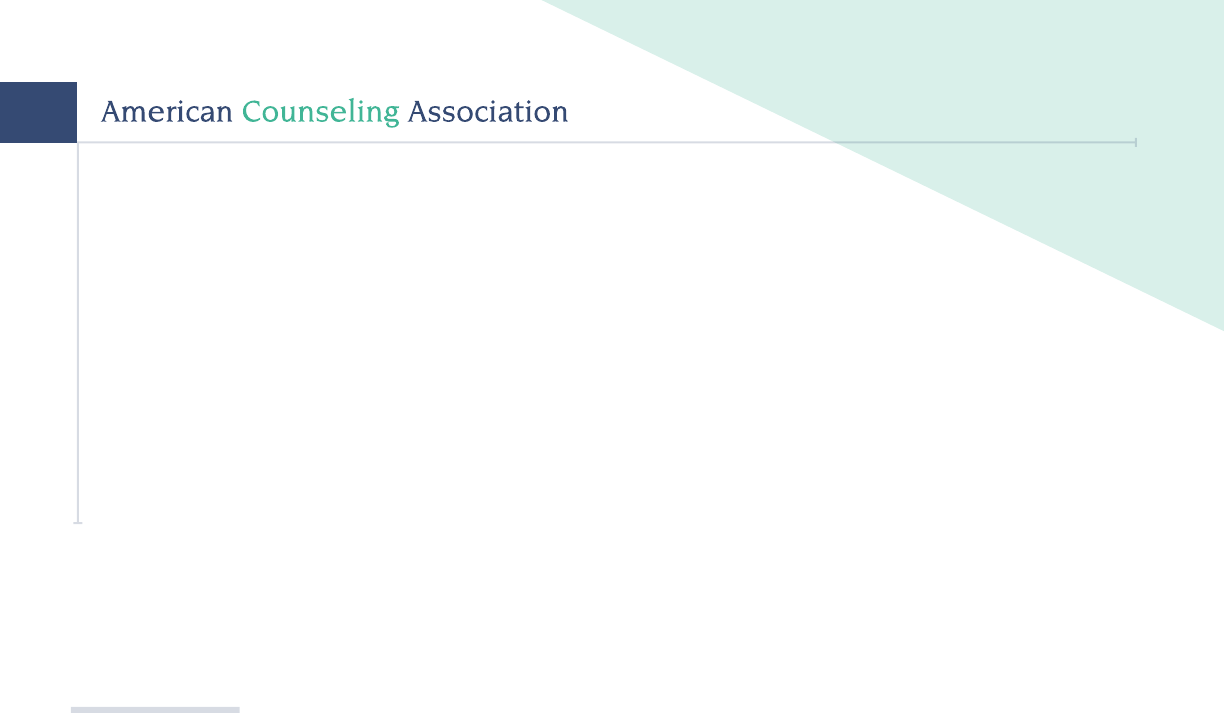
No Surprises Act
This FAQ below is geared towards counselors working in a solo private practice
setting. Counselors employed in group practices and larger organizational
settings, or who work in facilities (including outpatient departments) are advised
to consult with their compliance department or lawyers regarding any changes
to processes with regards to the “No Surprises Act”. Graduate counseling
professors and clinical site supervisors should consult with their local state laws
and regulations regarding the billing and payment practices of services provided
by counseling students while in practicum, internship, and/or residency.
What is the “No Surprises Act?”
The “No Surprises Act”, hereafter referred to as “the Act,” which became
eective on January 1, 2022, aims to increase price transparency, and reduce
the likelihood that clients receive a “surprise” medical bill. Specifically, the Act
requires healthcare providers to inform clients or their insurer of a “good faith
estimate” (“GFE”) of the costs for a scheduled service or upon request before
the service is provided.
Additionally, the Act aims to reduce “surprise” medical bills from out-of-network
providers providing services related to an in-network facility visit by: (i) requiring
that such providers charge patients no more than the in-network cost sharing
amount and prohibiting balance billing, absent advanced notice, and consent
from the client. Balance billing is when a healthcare provider bills a patient
for the dierence between the total cost of services charged and the amount
the insurance pays. For such “surprise” medical bills, the Act creates a new
baseball-style independent dispute resolution process when providers and
insurers are unable to agree on the out-of-network rate for a particular claim (or
group of claims for the same service).
The Act also has introduced new notice requirements for healthcare providers.
What is the definition of providers, and are counselors
subject to this law?
The Act defines “provider” broadly to encompass all healthcare providers
practicing within the scope of a state-issued license. Professional counselors
working in a clinical setting with a state-issued practitioner license meet this
definition and are subject to this law.
for Professional
Counselors in
Private Practice
FAQs

2 | No Surprises Act | FAQs for Professional Counselors in Private Practice
Are counseling services subject
to this law?
Yes. Services related to mental health, and
substance use disorders are specifically included
in the Act. Services are defined broadly to include,
“all encounters, procedures, medical tests...
provided or assessed in connection with the
provision of health care.”
Good Faith Estimate
What is a Good Faith Estimate?
The “Good Faith Estimate”, hereafter referred to
as “GFE”, is a notification of expected charges
for a scheduled or requested item or service,
including items or services that are reasonably
expected to be provided in conjunction with
such scheduled or requested item or service
(whether provided by the provider or another
provider or facility). Note that CMS is deferring
the requirement to include items and services
provided by other providers or facilities in the
GFE for 2022 but encourages providers to do so
when feasible.
The expected charges should take into account
any discounts or financial assistance. GFEs are not
required for emergency services, which cannot
be scheduled in advance, unless specifically
requested by the client.
The GFE provisions are meant to give consumers
predictability of how much they will be charged
for services provided prior to keeping an
appointment or receiving any billable services.
The GFE must be communicated in written form,
either on paper or electronically.
To what category of clients do I need to
provide a Good Faith Estimate?
The Act requires providers to provide a GFE
directly to clients who are uninsured or self-
pay. Self-pay clients are those who are enrolled
in commercial insurance (including a Federal
Employees Health Benefits (“FEHB”) program
health benefits plan) but is not seeking to have a
claim submitted to that plan.
The Act also requires providers to provide a GFE
to a client’s insurer if the client is enrolled in a
commercial plan and seeking to have a claim
submitted to that plan. However, the Center for
Medicare and Medicaid Services (“CMS”) has
not issued regulations on these requirements for
insured patients and is deferring enforcement of
this requirement until such rules are issued and
final. Therefore, the information below focuses on
requirements for providing a GFE to uninsured or
self-pay clients.
Under the Act, providers are generally not
required to provide GFEs to individuals insured
under Medicare, Medicaid, or other federal health
care programs.
Do I have to ask if the client has health
care insurance?
Yes. Ask the client if they have any kind of health
care insurance and whether they intend to file a
claim to pay for your counseling services. If the
client is uninsured or will not seek to file a claim
with their health care insurance to pay for your
services, you must provide them with a GFE.
Do I have to provide a good faith estimate
to new or current clients?
Yes. You must provide a GFE to all new and
current uninsured or self-pay clients. The Act
makes no distinction between current or future

3 | No Surprises Act | FAQs for Professional Counselors in Private Practice
patients. Provider may provide clients with a
single GFE for recurring services (e.g., multiple
counseling visits). It must be noted that particular
GFE is good only for one year (12 months).
When do I need to provide a good
faith estimate?
The good faith estimate needs to be provided
within the following time frames:
• If the service is scheduled at least three
business days before the appointment date,
no later than one business day after the date
of scheduling.
• If the service is scheduled at least 10
business days before the appointment
date, no later than three business days after
scheduling.
• If the uninsured or self-pay client requests a
good faith estimate (without scheduling the
service), no later than three business days
after the date of the request. A new good
faith estimate must be provided, within the
specified time frames if the client schedules
the requested service.
If the information included in the GFE changes,
the provider must issue a new GFE no later than
one business day before the item or service is
scheduled to be furnished.
What is the good faith estimate based on?
The GFE is an estimation of the expected
charge(s) to an uninsured or self-pay client for a
scheduled or requested service. This expected
charge is the rate established by the counselor to
an uninsured or self-pay client (or the amount the
counselor intended to bill a healthcare plan for
insured patients) and inclusive of any discounts or
financial assistance.
What information should be included in a
good faith estimate?
Per the Centers for Medicare and Medicaid
Services (CMS), the following information should
be included in a good faith estimate:
• Client’s name and date of birth.
• A description of the primary service or item
in clear and understandable language, and
if it applies, the date that the service or
primary item is scheduled for.
• The “reasonably expected” items and
services that will be provided for that
primary item or service, and any other
items or services reasonably expected to
be provided in conjunction with the primary
item or service. This list should be itemized
and grouped by provider and facility.
Note that CMS is deferring the requirement
to include items and services provided by
other providers or facilities in the GFE for
2022 but encourages providers to do so
when feasible.
• The diagnostic codes, expected service
codes, and expected charges associated
with each listed service.
• Provider and facility information for each
person represented in the GFE, including
the provider’s name, NPI (National Provider
Identifier), TIN (Tax Identification Number),
state and oce or facility location where
the items or services are expected to be
furnished by the provider or facility.
• A list of the items or services that the
provider or facility anticipates will require
separate scheduling and that are expected
to occur before or after the expected period
of care for the primary item or service.

4 | No Surprises Act | FAQs for Professional Counselors in Private Practice
• Include the following disclaimers that are
required components of the GFE:
- There may be additional services or items
the provider or facility recommends that
many need to be scheduled or requested
separately.
- The information provided in the GFE is
only an estimate of items or services, and
that because of this, additional items or
services that are not reflected on that GFE
may be recommended during the course
of care and that actual charges may dier.
- The client has the right to initiate a client-
provider dispute resolution process if
the charges that are billed substantially
exceed the charges that were expected
and reflected in the GFE. This disclaimer
must include information about how to
initiate the dispute resolution process
and that initiating the dispute resolution
process will not adversely aect the
client’s quality of care.
- The good faith estimate is not a contract,
and it does not require the self-pay or
uninsured individual to obtain the items
or services from the providers or facilities
identified in the good faith estimate.
An example template of a Good Faith Estimate
form has been provided by CMS and can be
found here: Good Faith Estimate for Health Care
Items and Services
The CMS requires counselors include “applica-
ble diagnosis” codes in good faith estimates.
What diagnostic codes can counselors identify
for uninsured or self-pay clients they have not
seen yet?
We recommend reviewing the ACA Code of Ethics
about counselor responsibilities and client rights
regarding diagnosis. We oer the suggestion
of completing one general GFE form (using for
example, a code such as Z03.89 “no diagnosis”)
to provide individuals (potential clients) prior to
the first session (intake assessment) occurring.
Subsequent to the first appointment, the
counselor can include in the good faith estimate,
more accurate diagnostic codes and the CPT
(Current Procedural Terminology) codes for
recommended services. This updated form should
be provided to the client, per the timeline(s) and
guidelines specified above.
Do providers need to retain copies of good
faith estimates?
Ye s. GFEs are considered part of the client’s
medical record and must be maintained in the
same manner. Providers must provide a copy of
any previously issued GFEs furnished within the
last 6 years to an uninsured or self-pay client
upon request.
Is the good faith estimate binding?
No. The good faith estimate is just that, an
estimate. The actual amount charged may dier
from the estimate. However, if the actual amount
charged is substantially higher-defined as being
$400 or more than the good faith estimate- the
client has the right to dispute the charges through
a new federal patient-provider dispute resolution
process.
What documentation do I need to provide if
a client disputes a charge?
Upon notice from a selected dispute resolution
(“SDR”) that a client has initiated the dispute
resolution process, a provider has 10 business
days to provide:

5 | No Surprises Act | FAQs for Professional Counselors in Private Practice
• A copy of the good faith estimate provided
to the client
• A copy of the bill sent to the client
• Any supporting documentation
demonstrating that the dierence between
the billed charges and the expected charges
in the GFE reflects (i) the costs of a medically
necessary item or service and (ii) is based
on unforeseen circumstances that could
not have reasonably been anticipated by
the provider or facility when the good faith
estimate was provided.
What if my state has a surprise billing law?
Per CMS, the Act supplements state surprise
billing laws and does not supplant them. As long
as a state’s surprise billing law provides the same
level of protection as the Act, the state’s surprise
billing law will apply. Providers will need to comply
with any state requirements that are incremental
to the federal requirements under the Act. Contact
your state for more information and for related
questions.
Do I need to inform clients of the availability
of a good faith estimate?
Ye s. Providers must inform uninsured (or self-
pay) individuals, both in writing and orally, that
good faith estimates of expected charges are
available to uninsured (or self-pay) individuals
upon scheduling an item or service, or upon
request. Providers must provide written notice in
a clear and understandable manner prominently
displayed (and easily searchable from a public,
digital search engine) on the provider’s website,
in the oce, and on-site where scheduling or
questions about the cost of items or services
occur. In addition, the provider must orally
inform uninsured (or self-pay) individuals of
the availability of a good faith estimate when
questions about the cost of items or services
occur. Information regarding the availability of
a good faith estimate must be made available
in accessible formats and languages spoken by
individuals considering or scheduling items or
services with such provider. CMS has provided
a model notice that providers may use for these
purposes here: Good Faith Estimate for Health
Care Items and Services.
Do I need to update my informed consent?
Not necessary. The 2014 ACA Code of Ethics
states counselors are to include fees and billing
arrangements in their informed consent (A.2.b.).
As described above, providers must provide the
GFE within specific time frames, in advance of a
scheduled appointment (or services of scheduled
appointments for the same service). If patients
are provided with informed consent documents at
their first visit, that timing is too late to satisfy the
GFE requirements.
Additionally, as described in the question
immediately above, providers must in certain
places and in certain circumstances inform
the uninsured or self-paid client, both orally
and in writing, about their right to receive a
GFE. Counselors could consider including this
information in their informed consent; however,
that will not alleviate their obligation to provide
that notice as otherwise required (e.g., on a
website, in the oce, etc.).
Remember to communicate this information in
ways that are both developmentally and culturally
appropriate (A.2.c., ACA, 2014). Counselors have
the ethical imperative to ensure their clients
understand the cost of services, fees for no-shows
and cancelations, and any and all other billing and
financial practices and policies. This is a required

6 | No Surprises Act | FAQs for Professional Counselors in Private Practice
part of the informed consent process that doesn’t
begin and end at intake. Counselors must ensure
clients truly understand their personal financial
cost of receiving services throughout the entire
treatment process.
Can clients waive their right to a good
faith estimate?
There are no provisions in the Act which allows
clients to waive this estimate. The regulation
allows clients to waive some of the protections
related to balance billing but does not allow
providers to bypass the GFE through a client
waiver.
Is this all I need to know?
No. We recommend all counselors review the
pages below to learn more about the Act and its
requirements. There you will find more information
about its various nuances and requirements.
• Ending Surprise Medical Bills -CMS’s main
page about this legislation
• Provider requirements and resources: CMS
guidance regarding provider requirements
• The No Surprises Act’s Continuity of Care,
Provider Directory, and Public Disclosure
Requirements - CMS presentation outlining
provider requirements under the Act
• The No Surprises Act’s Prohibitions on
Balancing Billing: CMS presentation No
Surprises Act - Employee Benefits Security
Administration; U.S. Department of Labor
resources on the No Surprises Act including
guidance, fact sheets, and model documents
• § 149.610 Requirements for provision of
good faith estimates of expected charges for
uninsured (or self-pay) individuals - Link to
access regulations implementing the Act
• Federal Register :: Requirements Related to
Surprise Billing; Part I: First Interim Final Rule
published in the Federal Register
• Requirements Related to Surprise Billing;
Part II –Second Interim Final Rule published
in the Federal Register
• Tele-behavioral health insurance and billing
-ACA Resource
• Evidence on Surprise Billing: Protecting
Consumers with the No Surprise Act
Disclaimer: The contents of this publication are for informational and educational purposes only. Healthcare law is
complex, specific, and requirements vary by state. To adhere to any healthcare law or regulation, including the “No
Surprises Act” referenced in this article, requires expertise and information that is outside the scope of this article. This
article is not a substitute for seeking out personal legal advice and/or consultation. The ACA does not and cannot provide
legal advice or direction to our members or state associations. We encourage all professional counselors to consult with
their state licensure board and a healthcare attorney to ensure compliance with state and federal laws.
Source: Center for Medicare & Medicaid Services
